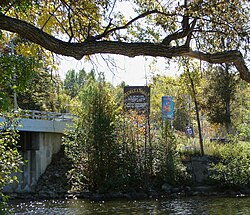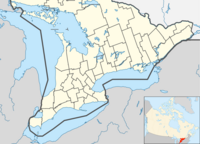Pikwakanagan First Nation
| Pikwàkanagàn | |
|---|---|
| Indian reserve | |
| Pikwakanagan (Golden Lake 39) Indian Reserve | |
 |
|
| Coordinates: 45°33′N 77°13′W / 45.550°N 77.217°WCoordinates: 45°33′N 77°13′W / 45.550°N 77.217°W | |
| Country |
|
| Province |
|
| County | Renfrew |
| First Nation | Algonquins of Pikwàkanagàn |
| Area | |
| • Land | 7.45 km2 (2.88 sq mi) |
| Population (2011) | |
| • Total | 432 |
| • Density | 58.0/km2 (150/sq mi) |
| Website | www.algonquinsof pikwakanagan.com |
The Algonquins of Pikwàkanagàn First Nation, formerly known as the Golden Lake First Nation, are an Algonquin First Nation in Ontario, Canada. Their territory is located in the former township of South Algona (now part of Bonnechere Valley) in the Ottawa Valley on Golden Lake.
As of October, 2008, the registered population of the First Nation was 1,992 people, of which only 406 people lived on their own reserve.
The name "Pikwàkanagàn" comes from the Algonquin, meaning "[beautiful] hilly country [covered] in evergreens".
In September 1856, five families petitioned the Governor General for a grant of 200 acres (81 ha) of land per family since their hunting grounds had been opened up for settlement and sale. Their request was denied. However on September 17, 1873, the Algonquins of Pikwàkanagàn received Crown Patent to a total of 1,561 acres (632 ha), which became the First Nation's reserve.
Many Algonquin skills are still practiced among the Algonquins of Pikwàkanagàn though assimilation with surrounding non-native communities and enforced Residential schooling has affected their people, including several generations of their population raised without their culture, language and traditions. Now efforts are being made to bring culture, language and tradition into the forefront of their lives. Community members still participate in harvesting for food and fur, an annual Pow-wow unites people and tribes, food and crafting skills have survived and language skills though greatly diminished are being introduced into the community again.
Commonly known families associated with the Algonquins of Pikwàkanagàn include: Amikons, Baptiste, Benoit, Bernard, Commanda, Cooke, Jocko, Kohoko, Lavalley, Leclaire, Meness, Pappin, Rabishaw, Sarazin, Tennisco, Timmerman, Two-Axe and Whiteduck.
Omàmiwininì Pimàdjwowin (the Algonquin Way Cultural Centre) and the Manido Chiman Museum are located at 1674 Mishomis Inamo, Pikwakanagan First Nation.
...
Wikipedia

